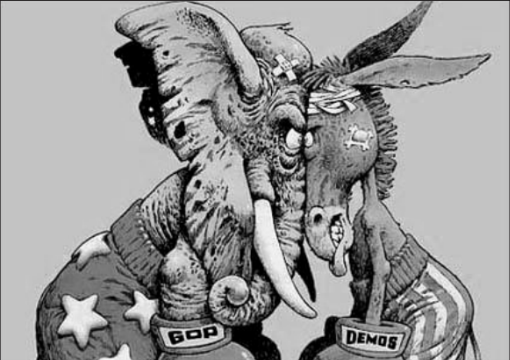Left hook, right jab; Perspectives on RFK Jr., books, and Bud Light

Students from the left and rightt take on issues in the Crier’s new debate column. (Courtesy / FLICKR)
May 4, 2023
LHRJ, deuxième. We are back with Mac Connors and Kellan Barbee of the College Republicans and Democrats, respectively. They share their personal thoughts on three questions. Neither has seen the other’s responses beforehand.
What should we think about RFK Jr.’s candidacy?
R: I don’t think RFK Jr.’s presidential campaign is a serious one. I would consider voting for him in a general election over several of the declared Republican candidates, including Donald Trump, but I do not think he is going to go far in the primary. One of Kennedy’s fatal flaws is his focus on a single issue, namely that of vaccine hesitancy. While I would love to see more pushback by elected leaders against draconian mandates as we saw during COVID, I think it is crucial for those leaders to also outline a plethora of policy goals if they are to be taken seriously.
L: It is my opinion that RFK Jr. and the other Democratic challengers to President Biden are not serious contenders for the Presidency. RFK Jr. has made significant contributions in his advocacy for environmental protections and Native rights, and those accomplishments stand out on their own. However, his promotion of COVID-19 misinformation and support of the scientifically debunked link between vaccines and autism is disqualifying. He has shared inaccurate information in the past about COVID-19, such as the effectiveness of ivermectin in treating COVID-19 and the rumored health risks of 5G technology, both of which lack scientific evidence. It is not fitting for any credible candidate to endorse these fringe theories.
What is the best book on politics published in the 21st Century?
L: The best book on politics published in the 21st century is Voter Z by Jennifer Graham. The book explores the increasingly important and noticeable role of Gen Z in the political atmosphere. As young people become increasingly more involved in the political process, it is important to note these accomplishments. The book explores various perspectives from Gen Z activists, community organizers, elected officials, and others who work to change the world around them. It connects them to significant moments in history, where young people affected positive change in their communities and the broader world.
R: It is no surprise that I am no fan of anything modern. I dislike modern writing, detest modern art, and I won’t even begin to express my opinions on modern music. In that fashion, I can readily admit that I have never read any political books from the 21st century. However, one book I would like to read soon is Harvard Law Professor Adrian Vermeule’s Common Good Constitutionalism (2022), which outlines an alternative legal approach based on natural law ethics to the simple “living constitutionalism” and “originalism” that have long been complace in legal jargon. Having read some scholarly articles by Vermeule, I look forward to reading his book soon.
Why has the Bud Light controversy been so significant when many other brands employ LGBT spokespersons?
R: The Bud Light controversy has been so significant because transgender issues are newer to people. Other brands have long employed gay and lesbian spokespersons, but this issue has caught many off guard. That being said, the controversy over this advertising is simply ludicrous. To say that transgender people have been gaining acceptance and promotion over the last decade, is perhaps the understatement of the century. The right should have seen advertisements such as these coming long ago. But, I would be remiss if I focused on the specifics of this situation. The right needs to learn a broader lesson from this controversy: stop shooting what you don’t like and begin articulating an intellectual rebuttal with dexterity.
L: Companies have every right to use whatever spokespersons they choose. Bud Light and other corporations that employ LGBTQ spokespeople are choosing inclusivity and community over exclusion and marginalization because it is the right thing to do. The LGBTQ community deserves representation in the media and in the world in a similar manner as other minority groups. The reactive responses to Bud Light’s use of a transgender woman in an ad are the consequences of taking a position, in this case, the correct position, on a divisive issue.


